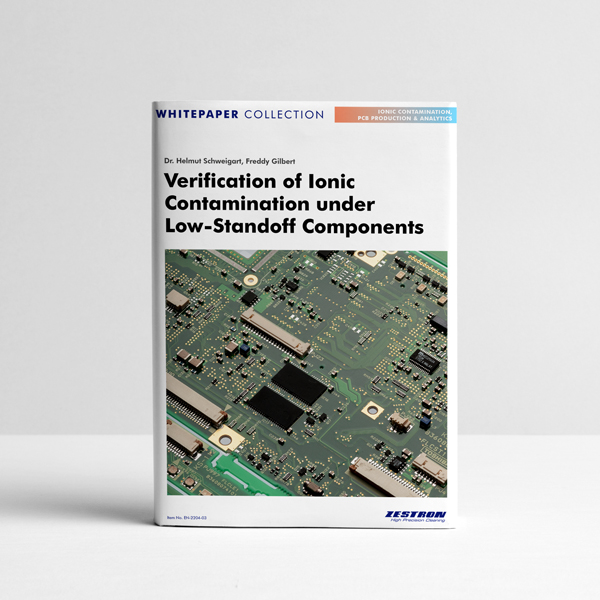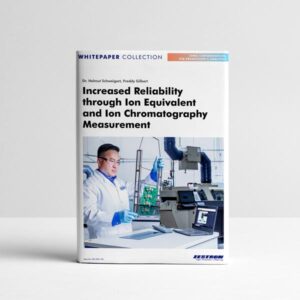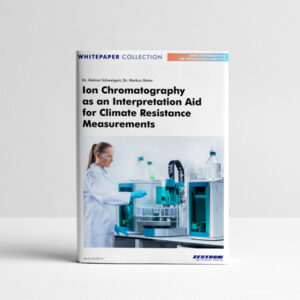Description
[04/2022]
Although minimising the component size has led to increased functionality with the same or even smaller assembly size, it has also led to a reduction in standoff among the components. As a result, in most cases an optical cleanliness verification at these locations is made difficult or is no longer possible. In order to nevertheless provide access for purity detection, especially with regard to ionic impurities in these narrow gaps, extractive analytical methods such as ion equivalence measurement (ROSE test) or ion chromatography (IC) are used.
In this study, the influence of temperature, extraction time and proportion of isopropanol in the extraction medium on the ion extraction will be enlightened.
Author
 Dr. Helmut Schweigart
Dr. Helmut Schweigart
Head of Reliability & Surfaces, ZESTRON EUROPE
Dr. Helmut Schweigart obtained his doctorate for research into the reliability of electronic sub-assemblies, and he has been employed at ZESTRON Europe since the early days of the company. He is now Head of Reliability & Surfaces Team. He is also a member of the Board of Management at GfKORR (Gesellschaft für Korrosionsschutz - a company specialising in corrosion inhibitors) as well as an active member of GUS (Gesellschaft für Umweltsimulation - an environmental simulation company) and of the IPC. He has already published numerous technical articles.
 Freddy Gilbert
Freddy Gilbert
Technology Analyst, ZESTRON EUROPE
Freddy Gilbert studied material sciences at the Graduate School of engineering of the University of Montpellier and the Technical University of Berlin. In his position as Technology Analyst in the ZESTRON Reliability & Surfaces team, he organises and conducts Technology Coachings focused on failure analysis, surface analysis as well as risk assessment.


 Dr. Helmut Schweigart
Head of Reliability & Surfaces, ZESTRON EUROPE
Dr. Helmut Schweigart obtained his doctorate for research into the reliability of electronic sub-assemblies, and he has been employed at ZESTRON Europe since the early days of the company. He is now Head of Reliability & Surfaces Team. He is also a member of the Board of Management at GfKORR (Gesellschaft für Korrosionsschutz - a company specialising in corrosion inhibitors) as well as an active member of GUS (Gesellschaft für Umweltsimulation - an environmental simulation company) and of the IPC. He has already published numerous technical articles.
Dr. Helmut Schweigart
Head of Reliability & Surfaces, ZESTRON EUROPE
Dr. Helmut Schweigart obtained his doctorate for research into the reliability of electronic sub-assemblies, and he has been employed at ZESTRON Europe since the early days of the company. He is now Head of Reliability & Surfaces Team. He is also a member of the Board of Management at GfKORR (Gesellschaft für Korrosionsschutz - a company specialising in corrosion inhibitors) as well as an active member of GUS (Gesellschaft für Umweltsimulation - an environmental simulation company) and of the IPC. He has already published numerous technical articles.
 Freddy Gilbert
Technology Analyst, ZESTRON EUROPE
Freddy Gilbert studied material sciences at the Graduate School of engineering of the University of Montpellier and the Technical University of Berlin. In his position as Technology Analyst in the ZESTRON Reliability & Surfaces team, he organises and conducts Technology Coachings focused on failure analysis, surface analysis as well as risk assessment.
Freddy Gilbert
Technology Analyst, ZESTRON EUROPE
Freddy Gilbert studied material sciences at the Graduate School of engineering of the University of Montpellier and the Technical University of Berlin. In his position as Technology Analyst in the ZESTRON Reliability & Surfaces team, he organises and conducts Technology Coachings focused on failure analysis, surface analysis as well as risk assessment.



